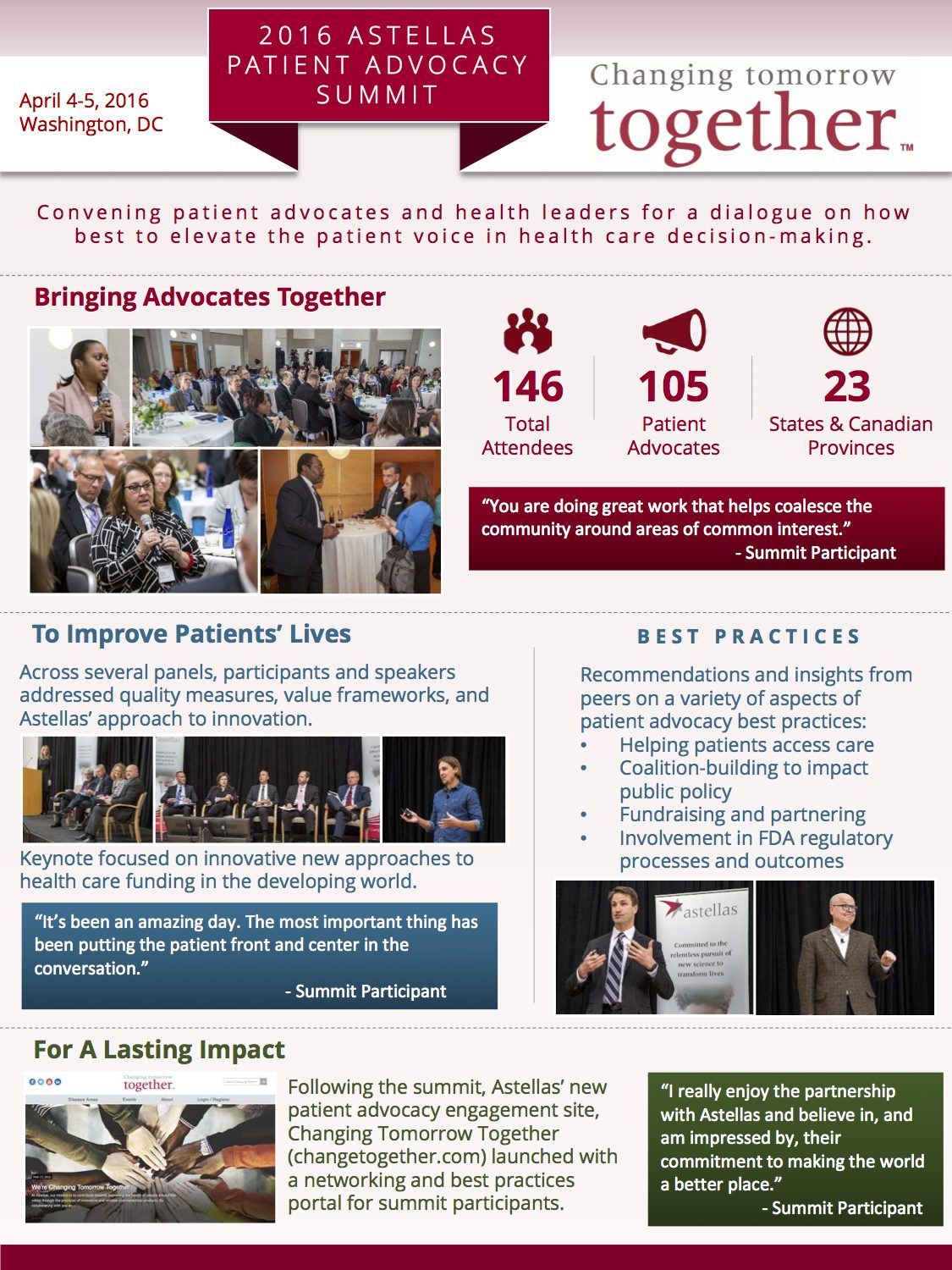“At this year’s digestive disease week in San Diego, CA, one of the original transplant surgeons regaled me with tales from the early 90s as he discussed navigating initial clinical skepticism, inter-institutional politics and regulatory hurdles. He ended his story with the simple statement: we fought for you. As a transplant recipient from that early era of immunosuppressants, I am very very grateful. The question we must ask ourselves a quarter century later with liver transplant success rates over 90% but severe organ shortages resulting in needless deaths is ‘who fights for patients today?’We are proud to answer that call to facilitate the same type of patient-focused commitment to clinical and health-system innovation with companies like Astellas, a founding GLI partnership network member. Please read this month’s Liver Matters blog post by Christine Moberg, Director of Stakeholder Engagement at Astellas.”
– Donna Cryer, CEO Global Liver Institute
Astellas on Patient Advocacy
By Christine Moberg
It is a tremendous honor to be one of the early contributors to the new Liver Matters blog. Those of us at Astellas applaud the Global Liver Institute’s commitment to patients dealing with liver cancer, Hepatitis C, and other liver diseases. Your organization was created to build productive partnerships that will strengthen and invigorate advocacy on behalf of patients and their loved ones, and we look forward to a long-standing, energetic collaboration with you. One of Astellas’ foundational areas of expertise and leadership is organ transplantation – and as we strive to build on our heritage and develop new medicines for cancer, immunologic conditions and other areas of unmet medical needs, our efforts can only be enhanced by our work with GLI.
Astellas recently hosted our second annual Patient Advocacy Summit in Washington, DC, bringing together more than 100 patient advocacy leaders from 92 different cross-therapeutic groups. We were quite pleased that your president and CEO Donna Cryer was one of the participants – and appreciated her thoughtful, constructive remarks. At this event, we had the opportunity to discuss a number of topics, including how to ensure that the patient voice is part of healthcare decision-making, where outcomes-based quality measures fit into healthcare delivery and how they align with patient needs, and how patient advocacy organizations can maximize their reach and resources.
A Matter of Value vs. Quality
Throughout these discussions, one point became abundantly clear. We are at an important crossroads in the way our healthcare system conducts itself. As value becomes the watchword in payment and delivery structures – striving to ensure that the system and patients gain the maximum benefit from every dollar spent – there will be an increasing emphasis on creating quality measures and value frameworks to determine whether particular treatments and therapies have sufficient “value” to justify making them accessible to patients.
And on this point, it is vital that the patient voice be heard. There was broad agreement at our Patient Advocacy Summit that, in developing measures, it would be counterproductive to continue to pursue “one size fits all” approaches that do not respect or reflect the differences between individual patients. There is no such thing as the “average” patient. Every case is different. People respond in various ways to different medication types. Advocacy organizations like the Global Liver Institute need to be heard on the importance of recognizing patient heterogeneity.
The Patient Voice Must Be Heard
On a related note, another point was raised during the discussions. While some quality measures are incentive-based to encourage providers to participate, there are currently few if any incentives tied to having consultations and conversations with patients themselves. It’s an interesting point and one that warrants further consideration.
The fact is, there is a natural inconsistency between the uniformity of quality measures, the intrinsic differences between patients that require personalized care and the state of precision medicine. As one presenter aptly stated, “Measurement is about standardization, while health care is about personalization.” How we resolve those inconsistencies will help determine the future shape of our healthcare system. There is one inarguable point, though. The patient voice has to be a fundamental component in the equation.
The Astellas Patient Advocacy Summit 2016 Infographic:


Christine Moberg is the Director of Stakeholder Engagement, Americas Region. You can follow Astellas for more updates on their Twitter.
